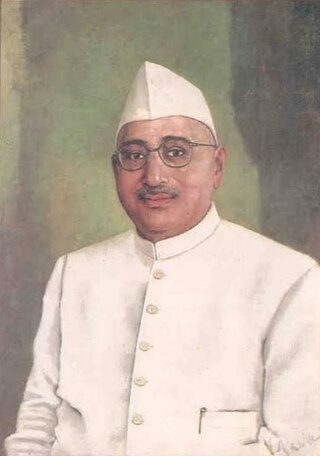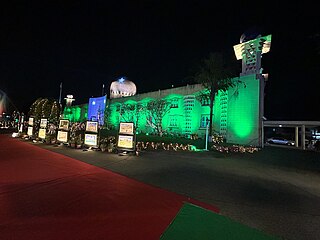India, officially the Republic of India, has full diplomatic relations with 201 states, including Palestine, the Holy See, and Niue. The Ministry of External Affairs (MEA) is the government agency responsible for the conduct of foreign relations of India. With the world's third largest military expenditure, second largest armed force, fifth largest economy by GDP nominal rates and third largest economy in terms of purchasing power parity, India is a prominent regional power and a rising superpower.

The Islamic Republic of Pakistan emerged as an independent country through the partition of India in August 1947 and was admitted as a United Nations member state in September 1947. It is currently the second-largest country within the Muslim world in terms of population, and is also the only Muslim-majority country in possession of nuclear weapons. De facto, the country shares direct land borders with India, Iran, Afghanistan, and China.

The Simla Agreement, also spelled Shimla Agreement, was a peace treaty signed between India and Pakistan on 2 July 1972 in Shimla, the capital city of the Indian state of Himachal Pradesh. It followed the Indo-Pakistani War of 1971, which began after India intervened in East Pakistan as an ally of Bengali rebels who were fighting against Pakistani state forces in the Bangladesh Liberation War. The Indian intervention proved decisive in the war and led to East Pakistan's breakaway from its union with West Pakistan and the emergence of the independent state of Bangladesh.

Sri Prakasa was an Indian politician, freedom-fighter and administrator. He served as India's first High Commissioner to Pakistan from 1947 to 1949, Governor of Assam from 1949 to 1950, Governor of Madras from 1952 to 1956 and Governor of Bombay from 1956 to 1962.

India–Pakistan relations are the bilateral ties between the Republic of India and the Islamic Republic of Pakistan. The two countries have a complex and largely hostile relationship that is rooted in a multitude of historical and political events, most notably the partition of British India in August 1947.
The Pakistan Rangers are a pair of paramilitary federal law enforcement corps' in Pakistan. The two corps are the Punjab Rangers and the Sindh Rangers. There is also a third corps headquarters in Islamabad but is only for units transferred from the other corps for duties in the federal capital. They are both part of the Civil Armed Forces. The corps' operate administratively under the Pakistan Army but under separate command structures and wear distinctly different uniforms. However, they are usually commanded by officers on secondment from the Pakistan Army. Their primary purpose is to secure and defend the approximately 2,200 km (1,400 mi) long border with neighbouring India. They are also often involved in major internal and external security operations with the regular Pakistani military and provide assistance to municipal and provincial police forces to maintain law and order against crime, terrorism and unrest. In addition, the Punjab Rangers, together with the Indian Border Security Force, participate in an elaborate flag lowering ceremony at the Wagah−Attari border crossing east of Lahore. The mutually-recognized India–Pakistan international border is different from the disputed and heavily militarized Line of Control (LoC), where the Pakistani province of Punjab adjoins Jammu and Kashmir and the undisputed international border effectively ends. Consequently, the LoC is not managed by the paramilitary Punjab Rangers, but by the regular Pakistan Army.

Pakistan and Bangladesh are both South Asian Muslim-majority countries. Following the end of British rule in India, the two countries formed a single state for 24 years. The Bangladesh Liberation War in 1971 resulted in the secession of East Pakistan as the People's Republic of Bangladesh. Pakistan recognized Bangladesh in 1974 after pressure from across the world. Today, bilateral relations between Bangladesh and Pakistan are considered to be cordial.

Canada–India relations also referred to as Indo-Canadian relations, are the bilateral relations between Canada and India. Canada and India have had longstanding bilateral relations, with shared traditions such as democracy. India has become one of the top source countries for immigration to Canada with Indian diaspora increasing to over one million as of 2022. According to Immigration, Refugees and Citizenship Canada (IRCC) data, of the more than 800,000 international students in Canada in 2022, 40 percent were from India, constituting the largest international student group in Canada. Bilateral trade between India and Canada has seen significant growth in recent years, reaching $8.16 billion in 2023. Both Canada and India are member nations of the Commonwealth association, and also part of G20, a group of world's largest economies.
Transport between India and Pakistan has been developed for tourism and commercial purposes and bears much historical and political significance for both countries, which have possessed few transport links since the partition of India in 1947. In 2019, all public transport links between the two countries were severed because of Pakistani protest at India's revocation of the special status of Jammu and Kashmir. The only way for travelers to make this journey is to cross on foot at Wagah.
TCA Raghavan is a former Indian diplomat who was a 1982 batch officer of the Indian Foreign Service. He has considerable experience in South Asia policy issues and considered an expert on Pakistan studies, including heading the Joint Secretary the Division of the Ministry of External Affairs in Pakistan Afghanistan and Iran (PAI) division. From 6 June 2013 till his retirement on 31 December 2015 Raghavan was the High Commissioner of India to Pakistan. After retirement he has authored two books- the first a biography of two Mughal nobles and the other a study of India Pakistan relations. In July 2018 he was appointed Director General of the Indian Council of World Affairs.

The High Commission of the Islamic Republic of Pakistan in New Delhi is the diplomatic mission of Pakistan in India. Between 1972 and 1989, the mission was known as the Embassy of Pakistan in New Delhi, as Pakistan was then temporarily a republic outside the Commonwealth of Nations, an intergovernmental organization primarily comprising former territories of the British Empire.

On 5 August 2019, the Government of India revoked the special status, or autonomy, granted under Article 370 of the Indian Constitution to Jammu and Kashmir—a region administered by India as a state which consists of the larger part of Kashmir which has been the subject of dispute among India, Pakistan, and China since 1947.
Pakistan's response to the revocation of the special status of Jammu and Kashmir started immediately after the revocation by India on 5 August 2019.

Afrasiab Mehdi Hashmi is a Pakistani diplomat and author. He served as Pakistan's High Commissioner to Bangladesh from 2011 to 2014, and as High Commissioner to New Zealand from 2016 to 2017.

The High Commission of Bangladesh in Islamabad is the chief diplomatic mission of Bangladesh to Pakistan. It is located in Sector F-6 of Islamabad. The present Bangladeshi High Commissioner to Pakistan is Md. Ruhul Alam Siddique, who assumed diplomatic duties in October 2020. Bangladesh also has a Deputy High Commission in Karachi, and an honorary consul in Lahore.

The Deputy High Commission of Bangladesh in Karachi is a diplomatic mission of Bangladesh in Pakistan. It is located in Phase VI of the Defence Housing Authority in Karachi. The presently designated Deputy High Commissioner is S. M. Mahbubul Alam, who was appointed in 2021. The Deputy High Commission reports to the High Commission of Bangladesh in Islamabad.
Suhrab Hossain is a Bangladeshi diplomat. He served as the High Commissioner of Bangladesh to Canada and Pakistan and ambassador to Thailand and Uzbekistan.









